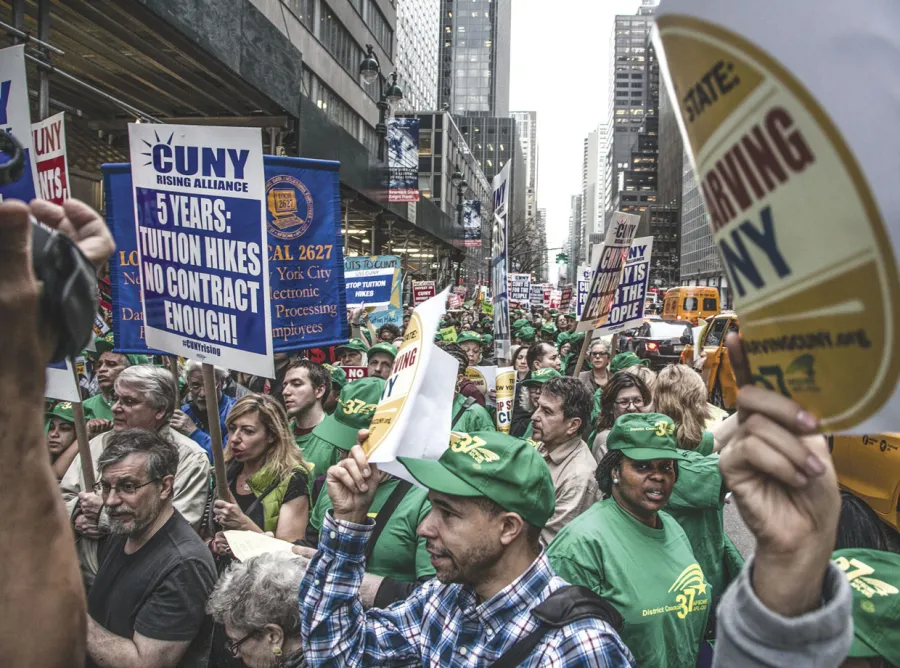Leading the Way: A Plan to Address the Challenges Facing DC 37

District Council 37 leaders have launched an ambitious, multi-year plan to fortify the union by organizing thousands of new members, expanding services, developing a larger presence in the workplace and the community and improving its financial condition.
The plan, which is called “Leading the Way: Restructuring DC 37 to address the challenges of the union,” comes as the union is nearly two years into a long-term grassroots program to build up its base of activists and mobilize members.
“As we work to make DC 37 a more dynamic union, we need to ensure our fiscal solvency,” DC 37 Executive Director Henry Garrido said. “But the budget is just one of the big challenges ahead of us. This is a great opportunity for all of us to shape the future of the union,” he said.
Garrido unveiled the detailed plan at the DC 37’s September delegates meeting, after elected leaders spent more than a year exploring ways to improve the union.
Organizing new members
The strategy calls for a dramatic increase in union membership, which has already returned to 125,000 — where it was before the downsizing of the Bloomberg era.
The union is working to represent 3,200 city employees improperly classified as managers. It also wants to make affiliation agreements with smaller unions and to organize workers outside the public sector, including employees of non-profit groups.
To expand and improve services, union leaders plan to establish a resource center that will answer members’ questions 12 hours a day; establish an Office of Community Partnership; open health clinics in every borough and enhance funding for the union’s housing program.
The union will continue its DC37/AFSCME Strong outreach campaign. The goal is to encourage all workers who receive union benefits but have not signed membership cards, known as “agency fee payers,” to join DC 37.
Union officials also aim to complete one-on-one talks with 50,000 members; form Member Action Teams at 50 worksites; and exceed a 10 percent participation rate in PEOPLE, the national union’s political action committee.
DC 37’s immediate challenge is to reduce a $1.6 million budget deficit.
The deficit is the result of downsizing during Michael Bloomberg’s 12 years as mayor; $4 million in damage to the union’s headquarters caused by Hurricane Sandy; rising personnel costs, and growing building and operational expenses. In an expenditure unrelated to the deficit, the union must spend $4 million on a new sprinkler system at our lower Manhattan headquarters.
Earlier this year, DC 37 started to address the fiscal year 2017 deficit by offering the staff a buyout and taking other steps to trim the expense of running day-to-day operations. Moving forward, other initiatives will include revamping information technology, in-sourcing cleaning and maintenance services, consolidating departments and enhancing accountability.
The union plans to implement a 25-cent increase in dues, which were last raised 12 years ago.
DC 37 will also reduce its subsidy of the payments that union locals make to the national union, the American Federation of State, County and Municipal Employees. AFSCME imposed a $1 per member increase on the locals several years ago, but DC 37 decided to subsidize it. The subsidy will be cut in half.
Prescription drugs, education programs
On Jan. 1, the copays of the prescription drug benefit will be increased to help the DC 37 Health & Security Plan address a projected $92 million deficit in fiscal year 2018.
The plan is going to close the health center at 186 Joralemon St. in Brooklyn and shift its services to the Manhattan center, which will increase its daily hours of service and be open seven days a week.
The DC 37 Education Fund, whose contribution from the city hasn’t increased since the 1970s, is expected to have an $8.5 million operations deficit in 2019. To tackle the fund’s deficit, the fund will focus more on job training to help members have better employment security and promotional opportunities.
The union will also will carry out an audit; pursue outside grants; cut underutilized and unnecessary programs; restructure the contract with the College of New Rochelle; eliminate an over-reliance on contracted consultants, and establish programs with the City University of New York.
“We have a lot on our plate,” Garrido said. “But I am confident that we are on the road to building a better union.”
